EU signs on to IoT safety label plan

Anne Neuberger Demetrius Freeman/The Washington Post via Getty Images
A U.S.-led effort to offer cyber-safe labels for connected devices is gaining momentum internationally.
A Biden administration plan to create a labeling scheme for connected devices such as smart home products is getting traction internationally.
Anne Neuberger, the deputy national security advisor for cyber and emerging technologies, announced at the CES conference and trade show in Las Vegas on Thursday that the U.S. has signed an agreement with the European Union "on a joint roadmap for a consumer labeling program" that alerts shoppers to the cybersecurity of internet-of-things devices.
"Clearly, we all want our consumers to feel safe. We all want our critical infrastructure using connected tech to be safe from disruption," Neuberger said. "So this joint roadmap is a way that we're moving out quickly."
The consumer labeling scheme was part of the Biden administration's executive order on cybersecurity from May 2021, but efforts to tag IoT devices goes back even further than that.
The policy calls for a cyber trust mark to appear on the packaging of smart devices that meet certain security standards in much the same way that the Energy Star label offers a seal of approval for energy efficient electronics and appliances.
The Federal Communications Commission is taking the lead on obtaining input from stakeholders in an ongoing proceeding that has drawn interest from trade associations, consumer electronics companies and even the government of the People's Republic of China.
A comment from multiple leading trade groups including the Consumer Technology Association, the U.S. Chamber of Commerce and the Information Technology Industry Council in support of consumer labeling urged U.S. officials to "encourage international alignment of cybersecurity labeling practices and mutual recognition agreements."
The push to finalize the labeling plan and associated standards is "moving along at a quick clip," Neuberger said. She expects the policy to be finalized by the end of 2024. "So shortly thereafter, consumers shopping online or in stores can look for the mark and know they're bringing cybersafe products into their homes or into their offices," she said.



